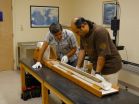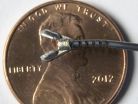(Press-News.org) Boston, MA -- More than 70% of pollen and honey samples collected from foraging bees in Massachusetts contain at least one neonicotinoid, a class of pesticide that has been implicated in Colony Collapse Disorder (CCD), in which adult bees abandon their hives during winter, according to a new study from Harvard T.H. Chan School of Public Health.
The study will be published online July 23, 2015 in the Journal of Environmental Chemistry.
"Data from this study clearly demonstrated the ubiquity of neonicotinoids in pollen and honey samples that bees are exposed to during the seasons when they are actively foraging across Massachusetts. Levels of neonicotinoids that we found in this study fall into ranges that could lead to detrimental health effects in bees, including CCD," said Chensheng (Alex) Lu, associate professor of environmental exposure biology in the Department of Environmental Health at Harvard Chan School and lead author of the study.
Since 2006, there have been significant losses of honey bee colonies. Scientists, policymakers, farmers, and beekeepers are concerned with this problem because bees are prime pollinators of roughly one-third of all crops worldwide.
Previous studies analyzed either stored pollen collected from hives or pollen samples collected from bees at a single point in time. In this study, the Harvard Chan School researchers looked at pollen samples collected over time--during spring and summer months when bees forage--from the same set of hives across Massachusetts. Collecting pollen samples in this way enabled the researchers to determine variations in the levels of eight neonicotinoids and to identify high-risk locations or months for neonicotinoid exposure for bees. To do so, the researchers worked with 62 Massachusetts beekeepers who volunteered to collect monthly samples of pollen and honey from foraging bees, from April through August 2013, using pollen traps on the landings of beehives. The beekeepers then sent the samples to the researchers.
The researchers analyzed 219 pollen and 53 honey samples from 62 hives, from 10 out of 14 counties in Massachusetts. They found neonicotinoids in pollen and honey for each month collected, in each location--suggesting that bees are at risk of neonicotinoid exposure any time they are foraging anywhere in Massachusetts.
The most commonly detected neonicotinoid was imidacloprid, followed by dinotefuran. Particularly high concentrations of neonicotinoids were found in Worcester County in April, in Hampshire County in May, in Suffolk County in July, and in Essex County in June, suggesting that, in these counties, certain months pose significant risks to bees.
The new findings suggest that neonicotinoids are being used throughout Massachusetts. Not only do these pesticides pose a significant risk for the survival of honey bees, but they also may pose health risks for people inhaling neonicotinoid-contaminated pollen, Lu said. "The data presented in this study should serve as a basis for public policy that aims to reduce neonicotinoid exposure," he said.
INFORMATION:
Other Harvard Chan School authors of the study included doctoral student Chi-Hsuan Chang, research fellow Lin Tao, and research associate Mei Chen.
Funding for this study came from the Woodshouse Foundation and the Harvard-NIEHS Center for Environmental Health (P30ES000002).
"Distributions of neonicotinoid insecticides in the Commonwealth of Massachusetts: a temporal and spatial variation analysis for pollen and honey samples," Chensheng (Alex) Lu, Chi-Hsuan Chang, Lin Tao and Mei Chen, Journal of Environmental Chemistry, online July 23, 2015, doi: 10.1071/EN15064
Visit the Harvard Chan website for the latest news, press releases, and multimedia offerings.
Harvard T.H. Chan School of Public Health brings together dedicated experts from many disciplines to educate new generations of global health leaders and produce powerful ideas that improve the lives and health of people everywhere. As a community of leading scientists, educators, and students, we work together to take innovative ideas from the laboratory to people's lives--not only making scientific breakthroughs, but also working to change individual behaviors, public policies, and health care practices. Each year, more than 400 faculty members at Harvard Chan teach 1,000-plus full-time students from around the world and train thousands more through online and executive education courses. Founded in 1913 as the Harvard-MIT School of Health Officers, the School is recognized as America's oldest professional training program in public health.
The over 50s who are 'successful agers'--healthy, active, sociable, and well off--are more at risk of harmful drinking than their less successful peers, concludes research published in the online journal BMJ Open.
Harmful drinking is a "middle class phenomenon" which may be a hidden health and social problem in otherwise successful older people, warn the researchers, who call for explicit guidelines on alcohol consumption for this group.
They base their findings on more than 9000 responses to the two most recent waves (2008-9 and 2010-11) of the English Longitudinal ...
Two new studies, both published in The Lancet, suggest that two different classes of drugs, aromatase inhibitors (AIs) and bisphosphonates, can each improve survival prospects for postmenopausal women with early breast cancer. Moreover, the researchers suggest that the two types of drug can be used together, increasing the benefits while also decreasing some side-effects.
Most women are post-menopausal when they develop breast cancer, and breast cancer is usually found early, when surgery can remove all detectable disease, but might leave dangerous undetected micrometastases ...
A class of hormonal drugs called aromatase inhibitors substantially reduce the risk of death in postmenopausal women with the most common type of breast cancer, a major study of more than 30,000 women shows.
The research underlines the importance of aromatase inhibitors in the treatment of oestrogen receptor (ER)-positive breast cancer - and shows they reduce risk of death by significantly more than the older hormonal treatment tamoxifen.
The study, published in The Lancet today (Friday), is relevant to postmenopausal women with ER-positive breast cancer, which accounts ...
Highlight
Proteins in the Wnt signaling pathway help drive kidney scarring that can lead to chronic kidney disease.
Washington, DC (July 23, 2015) -- Chronic diseases such as diabetes and hypertension cause injury to the kidneys, which can lead to scarring and the development of chronic kidney disease. By identifying proteins important to this scarring process, researchers now point to a new strategy for possibly preventing kidney failure and the need for dialysis or transplantation in many patients. The findings appear in an upcoming issue of the Journal of the ...
MIAMI - New research reveals that some of the earliest civilizations in the Middle East and the Fertile Crescent may have been affected by abrupt climate change. These findings show that while socio-economic factors were traditionally considered to shape ancient human societies in this region, the influence of abrupt climate change should not be underestimated.
A team of international scientists led by researchers from the University of Miami (UM) Rosenstiel School of Marine and Atmospheric Science found that during the first half of the last interglacial period known ...
A biomarker found in the blood of alcohol users is significantly higher in binge drinkers than in those who consume alcohol moderately, according to a study by researchers at the University of Illinois at Chicago. The biomarker, called phosphatidylethanol (PEth), could be used to screen young adults for harmful or heavy drinking such as binge drinking.
Having performed extensive research on alcohol and its effects on health throughout her career, Mariann Piano, professor and head of the department of biobehavioral health science in the UIC College of Nursing, knew PEth ...
With the flick of a tiny mechanical wrist, a team of engineers and doctors at Vanderbilt University's Medical Engineering and Discovery Laboratory hope to give needlescopic surgery a whole new degree of dexterity.
Needlescopic surgery, which uses surgical instruments shrunk to the diameter of a sewing needle, is the ultimate form of minimally invasive surgery. The needle-sized incisions it requires are so small that they can be sealed with surgical tape and usually heal without leaving a scar.
Although it's been around since the 1990s, the technique, which is also called ...
NEW YORK, NY (July 23, 2015)--Researchers at Columbia University Medical Center (CUMC) have developed a computer algorithm that is helping scientists see how drugs produce pharmacological effects inside the body. The study, published in the journal Cell, could help researchers create drugs that are more efficient and less prone to side effects, suggest ways to regulate a drug's activity, and identify novel therapeutic uses for new and existing compounds.
"For the first time we can perform a genome-wide search to identify the entire set of proteins that play a role in ...
SPOKANE, Wash. - Pharmaceutical sciences researchers at Washington State University have discovered a protein's previously unknown role in cell division.
The well known protein ATF5, or Activating Transcription Factor 5, controls how often specific genes are expressed, or copied from DNA. ATF5 regulates genes that control cell survival.
But the research team has identified a part this protein is playing that is not related to its transcription factor role. Within the part of the cell called the centrosome, ATF5 is also acting as a structural protein.
Structural ...
Knee pain in older adults, often caused by osteoarthritis, usually means more visits to the doctor and also can be a harbinger of disability.
A study led by Daniel White, assistant professor of physical therapy at the University of Delaware, found that an intensive regimen of regular exercise and a healthy diet might reduce the short-term onset of knee pain for overweight adults with Type 2 diabetes mellitus.
Published in Arthritis Care and Research, White's article "Can an Intensive Diet and Exercise Program Prevent Knee Pain Among Overweight Adults at High Risk'' ...


